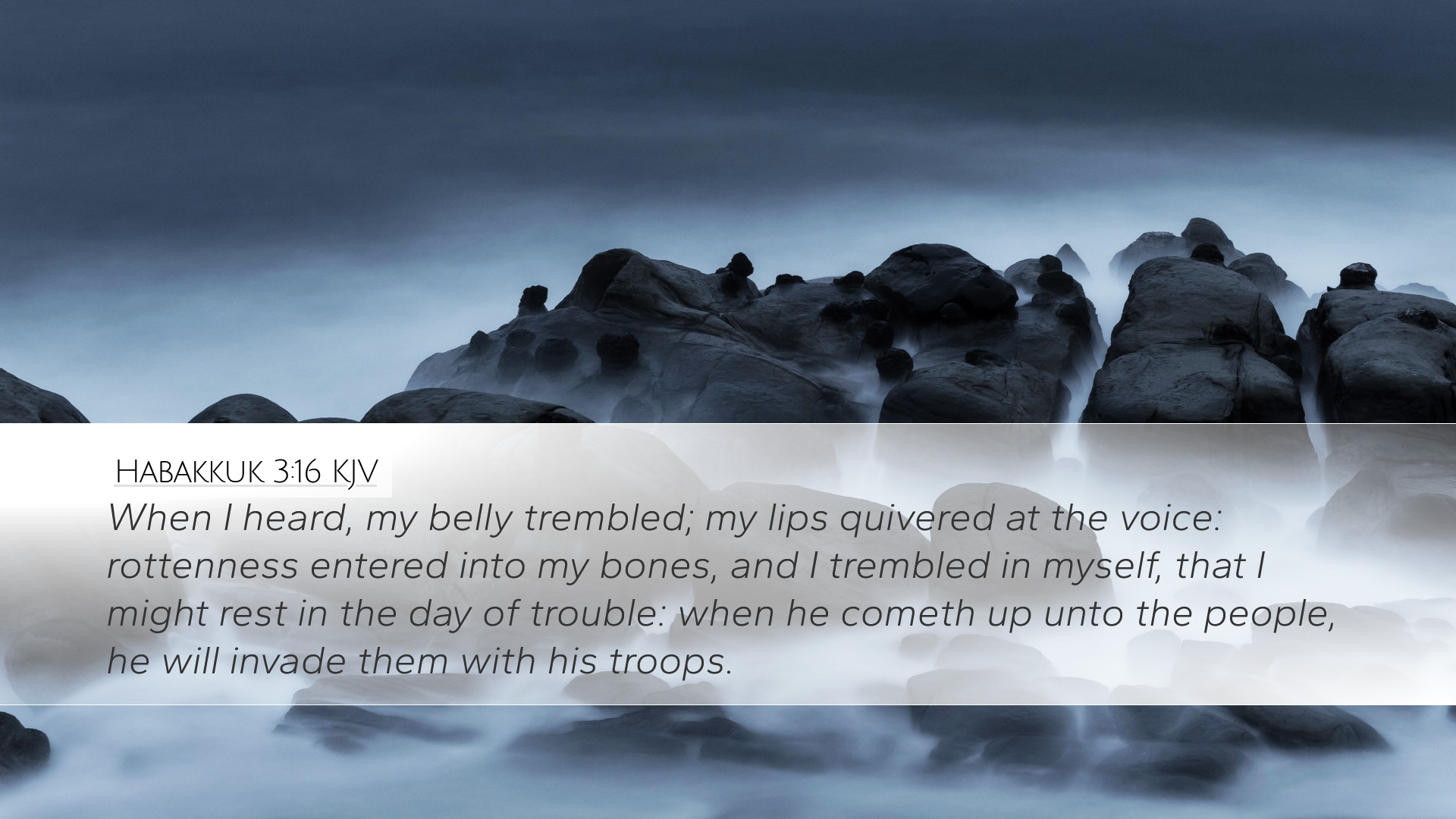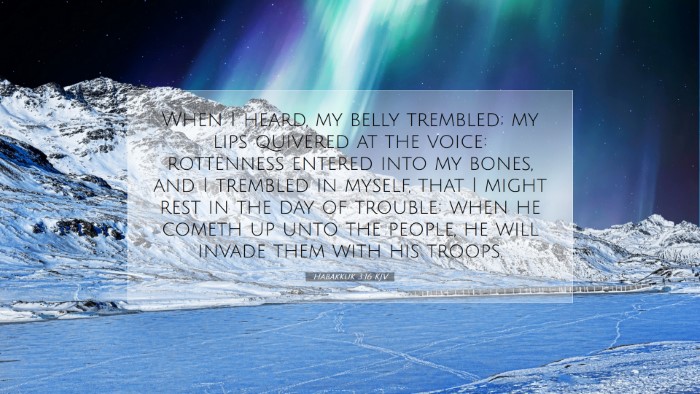Old Testament
Genesis Exodus Leviticus Numbers Deuteronomy Joshua Judges Ruth 1 Samuel 2 Samuel 1 Kings 2 Kings 1 Chronicles 2 Chronicles Ezra Nehemiah Esther Job Psalms Proverbs Ecclesiastes Song of Solomon Isaiah Jeremiah Lamentations Ezekiel Daniel Hosea Joel Amos Obadiah Jonah Micah Nahum Habakkuk Zephaniah Haggai Zechariah MalachiHabakkuk 3:16
Habakkuk 3:16 KJV
When I heard, my belly trembled; my lips quivered at the voice: rottenness entered into my bones, and I trembled in myself, that I might rest in the day of trouble: when he cometh up unto the people, he will invade them with his troops.
Habakkuk 3:16 Bible Commentary
Commentary on Habakkuk 3:16
Habakkuk 3:16 states: "When I heard, my belly trembled; my lips quivered at the voice; rottenness entered into my bones, and I trembled in myself, that I might rest in the day of trouble: when he cometh up unto the people, he will invade them with his troops."
This poignant verse encapsulates the visceral reaction of the prophet Habakkuk to the divine revelations concerning impending judgment and calamity. It serves as a profound reflection on the nature of prophetic revelation, human frailty, and the sovereignty of God in times of distress.
Understanding the Context
Habakkuk's prophecy unfolds during a tumultuous period in Judah, where the nation faced impending invasion by the Babylonians. The prophetic dialogue with God reveals a deep struggle with the apparent injustice of God allowing a wicked nation to execute judgment on His own people. The prophet seeks to understand God’s justice, leading to a profound declaration of faith amidst turmoil.
1. The Emotional Turmoil of the Prophet
The expression of Habakkuk's physical reactions—trembling belly, quivering lips, and rottenness in bones—signifies deep emotional disturbance. Matthew Henry emphasizes the intense psychological struggle that accompanies divine revelation and the fear that arises when confronted with God’s holiness and judgment.
- Fear and Awe: Henry points out that such emotional turmoil is universal when individuals contemplate God's omnipotence and the weight of their sins.
- The Burden of Prophethood: Adam Clarke adds that the heavy burden of prophetic insight can lead to physical manifestations of fear, showcasing how seriously the true prophet takes God’s word.
2. The Anticipation of Judgment
Habakkuk's trembling heart anticipates the day of trouble, which is a recurring theme throughout the prophetic literature. Albert Barnes discusses how this 'day of trouble' symbolizes God’s intervention in the affairs of humanity, serving either as a point of judgment or a means of salvation. The prophet recognizes that divine justice inevitably leads to human accountability.
Understanding Divine Justice
The hesitance and trembling that Habakkuk experiences reveal a profound understanding of God’s character as just and righteous. This notion of divine justice is essential for theologians and scholars studying the nature of God’s engagement with humanity throughout Scripture.
3. The Role of the Prophet
The prophet Habakkuk stands as a mediator between God and the people, grappling with God’s revelation while preparing to communicate God’s message. Clarke notes the importance of a prophet's role in guiding the people through periods of judgment, offering hope amidst despair.
- Preparation for Prophetic Revelation: Habakkuk's emotional response prepares him to convey God’s impending judgment accurately.
- Call to Trust in God: Even in fear, there is a call to rest and trust in God’s sovereignty, emphasizing the dual nature of divine judgment and mercy.
4. Theological Implications
The verse raises significant theological questions concerning the nature of suffering and divine justice. The emotional turmoil of the prophet speaks to the enduring struggle of believers grappling with the problem of evil and the reality of suffering.
Faith Amid Distress
Amidst the overwhelming dread, Habakkuk’s trembling ultimately leads him to rest in the assurance of God’s sovereignty. This realization is echoed in Barnes' commentary, highlighting the necessity of faith even when circumstances defy understanding.
- The Nature of Faith: Faith is not the absence of fear, but rather the presence of trust in God’s promises regardless of external circumstances.
- The Purpose of Distress: Distress serves a purpose; it refines faith and leads the believer closer to an understanding of God’s will.
5. Reflection for Today’s Believers
Habakkuk 3:16 remains deeply relevant for today’s believers. The emotional reactions of the prophet remind us that faith does not negate feelings; rather, it invites us to bring our fears and uncertainties before God.
- Practical Applications: Like Habakkuk, modern believers are called to acknowledge their fear and uncertainty while seeking refuge in God’s promises.
- Encouragement during Troubling Times: This verse encourages believers to recognize that God's sovereignty is present even in chaotic circumstances, offering reassurance amid turmoil.
Conclusion
In conclusion, Habakkuk 3:16 serves as a powerful reminder of the complex interplay between fear, divine revelation, and faith. Through the lens of historical context and theological insight, this verse invites pastors, students, and scholars to ponder the depths of God’s justice and mercy, culminating in an unwavering trust in the sovereign Lord.


